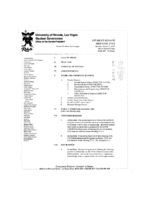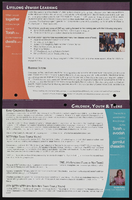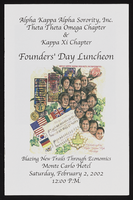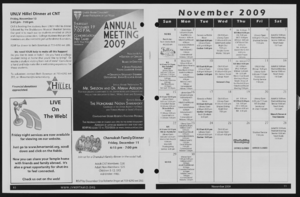Search the Special Collections and Archives Portal
Search Results

James Dean Leavitt oral history interviews: transcript
Date
Archival Collection
Description
Oral history interviews with James Dean Leavitt conducted by Claytee D. White on September 27 and October 4, 2022 for the Boyer Early Las Vegas Oral History Project. In this interview, Leavitt recalls his role in establishing a medical school at the University of Nevada, Las Vegas (UNLV), now known as Kirk Kerkorian School of Medicine. Leavitt was elected to the Board of Regents in 2004 while Jim Rogers was interim Chancellor of the Nevada System of Higher Education (NSHE), and he suggested the creation of an ad hoc committee Health Science Center Committee. In 2009, Leavitt became Chairman of the Board of Regents, Dan Klaich became Chancellor, and in the following year, Dr. Mark Doubrava joined the board. In May 2014, the planning dean was hired, Dr. Barbara Atkinson, and the UNLV School of Medicine was officially established on August 22, 2014.
Text

Meeting minutes for Consolidated Student Senate University of Nevada, Las Vegas, March 17, 1997
Date
Archival Collection
Description
Text

Congregation Ner Tamid Annual Report, 2006-2007
Date
Archival Collection
Description
2006-2007 annual report for Congregation Ner Tamid on the Greenspun Campus for Jewish life, learning, and spiritual renewal. The report includes statements, events, communities activities, statements, and photographs.
Mixed Content

Alpha Kappa Alpha Sorority, Theta Theta Omega Chapter Founders' Day committee reports
Date
Archival Collection
Description
From the Alpha Kappa Alpha Sorority, Incorporated, Theta Theta Omega Chapter Records (MS-01014) -- Chapter records file.
Text
Katherine A. Spilde Papers on Native American Gaming
Identifier
Abstract
The Katherine A. Spilde Papers on Native American Gaming include materials collected by anthropologist Katherine Spilde about Native American gaming and the greater gaming industry. The materials date from 1789 to 2015, with the bulk of materials dating from 1995 to 2010. Materials dating from the eighteenth and nineteenth centuries are reproductions of key court opinions and treaties concerning Native American rights and sovereignty. The majority of the materials document Native American gaming following the passage of the 1988 Indian Gaming Regulatory Act (IGRA). The papers detail Native American gaming enterprises both on and off reservations, the socioeconomic impact of gaming, and the legislative history of Native American gaming in the United States. The papers include research and subject files created by Dr. Spilde during her employment with the National Gambling Impact Study Commission (NGISC), the National Indian Gaming Association (NIGA), and the Harvard Project on American Indian Economic Development (HPAIED). The collection includes socioeconomic reports; testimonies; correspondence; memos; press releases; photographs; audiovisual materials; promotional materials from casinos and tourist attractions; brochures; fact sheets; summaries; booklets; pamphlets; advertisements; tourism materials; journal articles; legal briefs; legislative documents; court opinions; Dr. Spilde’s notes; presentations; packets, agenda, schedules, and itineraries from conferences; periodicals; Native American and community newspapers; and newspaper articles. The collection includes materials about over one hundred federally recognized Native American nations. Also included are materials that document the socioeconomic impact of gaming, the international gaming industry, criminal activities related to gaming, advertising about gaming and casinos, lotteries, internet gaming, compulsive gambling, and bankruptcy as a result of gambling.
Archival Collection
William Geagley Collection on Nuclear Safety
Identifier
Abstract
The William Geagley Collection on Nuclear Safety contains government publications, memoranda, and pamphlets about counteracting nuclear contamination of food supplies from 1951 to 1960. The materials primarily document Geagley’s oversight of the development of food safety contingency plans for the Michigan Department of Agriculture. The materials also contain information relating to the Nevada Test Site’s plans for Operation Plumbbob, atmospheric and underground nuclear tests held in 1957 in Nevada.
Archival Collection

Greg Phelps oral history interview: transcript
Date
Archival Collection
Description
Oral history interview with Greg Phelps conducted by Claytee D. White on November 15, 2017 for the Remembering 1 October Oral History Project. Greg Phelps discusses moving to Las Vegas, Nevada in 2002 for work and attending the 2017 Route 91 Harvest festival with his mother and wife. He describes the event venue as well as his recollection of the shooting. Phelps explains how his life changed after that day, describing the true friendships he gained and his greater appreciation for living.
Text

Meeting minutes for Consolidated Student Senate University of Nevada, Las Vegas, November 5, 1987
Date
Archival Collection
Description
Text


